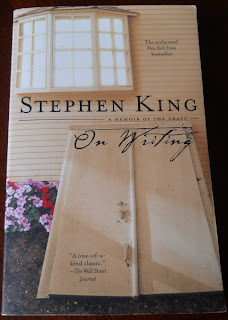 |
| Photo courtesy of PublicDomainPictures.net |
"If you don't have the time to read,
you don't have the time (or the tools) to write."
~ Stephen King in On Writing
In the quote above, King is talking about reading novels and other books... lots and lots of them... for the sheer enjoyment of reading -- learning, as you go, about what makes some writing "good" and other writing "not-so-good" (or worse). While I completely agree with him, I also believe there are a few reference books out there that can help provide writers with some of the tools they need.
First of all, every writer needs a good dictionary and thesaurus. I own a Webster's Dictionary and a Roget's Thesaurus, both of which are now tattered from heavy use. When I'm typing stories on the computer, however, I find it easier -- quicker -- to make use of the online site, Dictionary.com. The site contains a dictionary and a thesaurus, plus it often provides fun tidbits about words.
Another book that I keep handy when I'm writing is one I received as a teenager, in an English class: Reference Handbook of Grammar & Usage by Scott, Foresman and Company, 1972. It's not exciting reading, true. It does provide easy-to-understand definitions and examples of correct grammar -- things like when to use "accept" instead of "except", and what someone means by a dangling participle.
I discovered this next book at the library last week, The Pen Commandments: A Guide for the Beginning Writer by Steven Frank, 2004. I picked it up with an armful of other books about writing, expecting to just flip through it when I got back home. Instead, I ended up reading the book cover to cover!
A humorous book with chapters such as "Thou Shalt Honor Thy Reader", "Thou Shalt Not Waste Words" and "Thou Shalt Not Covet Thy Neighbor's Prose", the book is geared toward teenagers. Though I didn't necessarily learn anything new myself, it was good to be reminded of these important "commandments". I believe the book would be a very useful read for any teens who are interested in writing, even those who merely want to improve their English assignments.
A book familiar to many writers, young and old, is The Elements of Style by William Strunk, Jr. and E.B. White, 1935. I received it from the Institute of Children's Literature as one of my texts for my correspondence course. It contains rules for punctuation and grammar, along with principles of composition and reminders about style. This book is often considered a must-have for students and aspiring writers.
I started with Stephen King, and I'll end with him, too. I have read his book On Writing: A Memoir of the Craft (2000) half a dozen times, at least. Even those who are not writer wannabes or fans of King's other works (like I am) may enjoy this one. (A quick note: This book does contain some adult language.)
The first part of the book describes King's life, from his childhood to his rise to superstar author, all the while explaining how he learned to write.
The next section of the book talks about the craft of writing. King provides what I've found to be meaningful advice about writing -- information on characters, plot, dialogue, etc. and then recommendations for revising, sharing your work with others, and sending it on to publishers.
The final part of the book tells the story of the horrible car accident that almost killed King in 1999. More importantly, it tells how King survived the tragedy, through the help of his doctors... and a little thing called writing.




They didn't post here, but I had four friends from jr high/high school tell me on Facebook that they still have -- and use -- their copies of the Reference Handbook of Grammar & Usage, too! :)
ReplyDelete